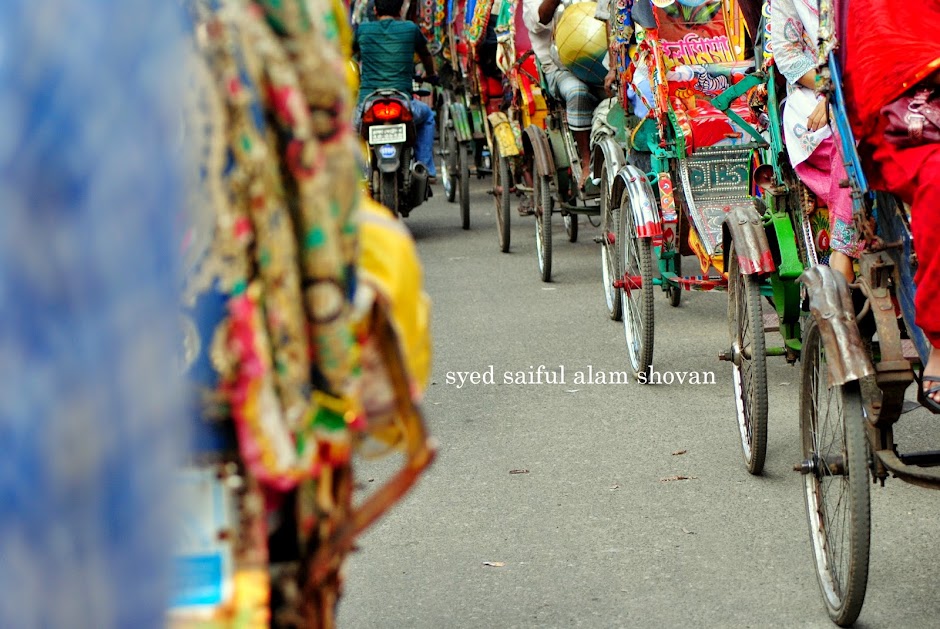For
years, city officials have complained that “no other city has as many rickshaws
as Dhaka,” somehow equating
rickshaws with poverty and backwardness. Now, with Guinness recognizing Dhaka as an exceptional city for
its many lakh non-polluting, truly green rickshaws, we can proudly say that “no
other city has as many rickshaws as Dhaka!”
The
city streets of Dhaka are choked with cars,
despite only 5% of trips being made by car. Imagine if that figure doubled to
10%? Traffic would come to a complete standstill, or we would have to bulldoze
more and more buildings in order to build ever wider roads, thus making
destinations ever farther apart and generating even more traffic. Rickshaws,
meanwhile, fit easily down all but the narrowest lanes. They move about as
quickly as the average car in crowded streets. They require no fuel to operate
and spew out no poisonous fumes. They provide much-needed employment to
countless people, and offer the comfort and convenience of door-to-door
transport to city dwellers.
European
transport officials talk proudly of the high percentage of trips that are made
by bicycle in their cities. Bicycles represent green transport, requiring no
fuel to operate and very few resources for their construction or disposal. The
“cleanest” car is still dirty when we consider the source of its fuel
(electricity often comes from coal, which is even worse than petrol) and all
the resources needed to build and dispose of it. And what is a rickshaw but a
three-wheeled bicycle?
The
fact that we can still breathe the air in Dhaka, and that it is still
possible to move about the city (albeit slowly and with difficulty) is in large
part thanks to the presence of the rickshaws. Even if we get a great system of
public transit, people will still need “last mile connectivity”: a way to get
to and from the public transit stops. Rickshaws will be essential for that
service. They are also essential for short trips, especially given how miserable
and dangerous the conditions currently are for walking and cycling. Rickshaws
offer a relatively independent mode of travel for people with disabilities. And
all without generating pollution.
 The
eyes of the world are now turning to Dhaka. For many years, the
rickshaw has been a symbol of pride, an example of local art cum transport. It
is exhibited in the Dhaka airport, at various hotels,
and at local and international events. Yet there are those who have been keen
to see it banned or restricted on city streets, despite the mounting evidence
that reducing the rickshaw has absolutely no beneficial effect whatsoever on
the flow of traffic, and that rickshaw bans likely contribute to
ever-increasing air pollution. With this welcome recognition from Guinness, it
is time to match our actions to our gestures. The rickshaw should indeed be a
source of national pride, and it should be welcomed and encouraged on our city
streets. We all need to recognize that the rickshaw is a solution, not a
problem, in terms of traffic congestion, pollution, affordable transport, and
employment.
The
eyes of the world are now turning to Dhaka. For many years, the
rickshaw has been a symbol of pride, an example of local art cum transport. It
is exhibited in the Dhaka airport, at various hotels,
and at local and international events. Yet there are those who have been keen
to see it banned or restricted on city streets, despite the mounting evidence
that reducing the rickshaw has absolutely no beneficial effect whatsoever on
the flow of traffic, and that rickshaw bans likely contribute to
ever-increasing air pollution. With this welcome recognition from Guinness, it
is time to match our actions to our gestures. The rickshaw should indeed be a
source of national pride, and it should be welcomed and encouraged on our city
streets. We all need to recognize that the rickshaw is a solution, not a
problem, in terms of traffic congestion, pollution, affordable transport, and
employment. 




3 comments:
Great article and excellent news. Often all we need is a change of perspective and suddenly things can change. A shame though that big decisions are actually determined by fickle opinions.
yeezy boost
timberland
curry 4
christian louboutin outlet
balenciaga shoes
adidas flux
ferragamo belt
nike shoes
yeezy shoes
ralph lauren uk
rtawys3678s
golden goose outlet
golden goose outlet
golden goose outlet
golden goose outlet
golden goose outlet
golden goose outlet
golden goose outlet
supreme outlet
golden goose outlet
golden goose outlet
Post a Comment